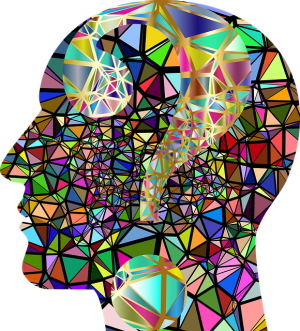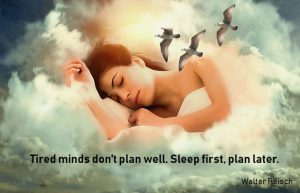Sleep routines and the wakeful brain
You may, like me, suffer from not being able to sleep at night sometimes. You may, like me, find a bad night’s sleep can make you feel listless, groggy and even unwell the following day. We all know how important sleep is to our wellbeing but why is so darned difficult to achieve that blissful nights’ rest?
Sleep routines can help, and I have a few.
I follow a suggested sleep regime before lying down.
- I make sure that my bedroom is cool.
- My curtains are lined with blackout material.
- I banish my iPad and phone to another room or a closed drawer.
- I switch off the TV at least an hour before I want to lay down to sleep.
Everything is quiet, cool and dark. But even taking these steps doesn’t guarantee I am going to find the arms of Morpheus easily or quickly.
Brain chatter disturbs sleep routines

I lie down and the brain chatter seems to start. My brain, behind my closed eyelids, ruminates over the day’s events. It starts picking apart any problems that have occurred, it comes up with all the smart retorts I could have made had I thought of them at the time. It can keep up this chatter for hours with me tossing and turning this way and that in bed becoming more and more frustrated. It is as if my brain is a kaleidoscope of ever-changing thoughts and images that no amount of sleep routines can quiet.
Sometimes my brain will allow me to fall asleep quite quickly and then, ping, 3am it wakes up. It wakes me up, full of new ideas and insists on playing with them and how they might work for the rest of the night. True, most of my most inspired ideas have come from this 3am wakeup call but physically my body rebels after a few nights of this rudeness.
Why sleep routines matter…you need sleep

A little while ago I read Matthew Walker’s excellent book ‘Why We Sleep’. It really helped me understand the ‘why’ behind the need to get restful sleep. I had not before realised how much replenishment we derive from a good night’s sleep and his explanations of the sleep cycle and the chemical reactions that are happening explained a lot.
Towards the end he reconfirmed the sleep regime I already undertake as well as coming up with a few other suggestions such as taking a bath before bed to relax which I have since incorporated.
- I have also found that having a notebook and pen by my bedside helps; when my 3am ‘I’ve had a great idea’ brain shouts at me I now wake up, scribble down the immediate thoughts and then say out loud, ‘I’ve got it – I’ll take it further tomorrow’.
- Meditation before climbing into bed, only done after the hour of peace, quiet and no electronic devices, has also calmed down the internal chatter.
- Ensuring I get some fresh air during the day,
- Camomile tea, having a quiet soothing track of sea waves in the background have also helped immeasurably.
Sometimes no sleep routine works, and I must distract myself
My PTSD does mean, occasionally there are some nights where, it doesn’t matter what I do, I am not going to sleep at all. I could take the medication I am prescribed for when this happens however I’m not a great one for taking tablets unless I really, really have to (especially since reading their effect in Mr Walker’s book). I’ve learnt to live with it and I no longer let it annoy me, I simply get up and get on with things while everyone else is still unconscious.
I believe that, because the world is so busy and we are all rushing around all day from the moment we wake until we are at liberty to go to sleep, we don’t factor in enough time to get rid of our thoughts. We don’t give our brain the space it needs to download, process and conclude the masses of information we are asking it to consume in every 24-hour period.
The answer? That will be different for every individual. I have shared some of the things I find are working for me. However, the 3 basics are pay attention to how important sleep is in your life, find sleep routines that work for you to get the best, most nourishing form of sleep and stay away from chemical solutions – they really do not work.


